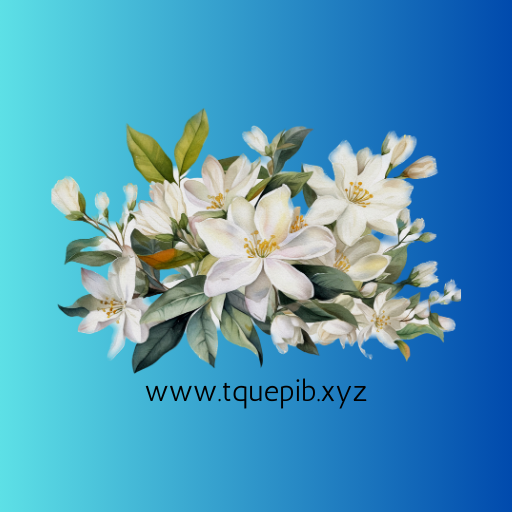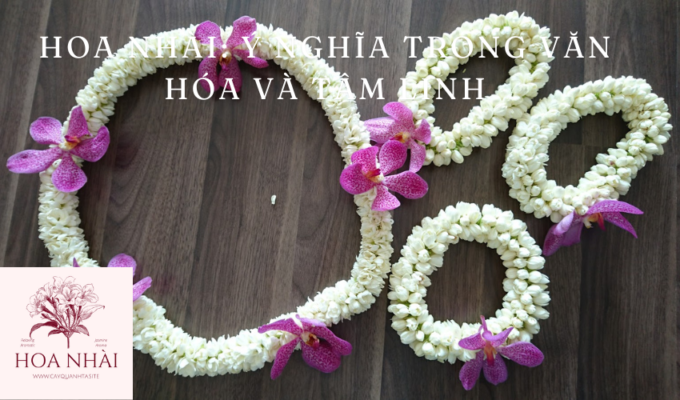
“Jasmine: In culture and spirituality” is a short article about the meaning of jasmine in culture and spirituality.
Introduction to jasmine and its significance in culture and spirituality
Jasmine, also known as Lily, is a flower that is often grown and loved for its delicate beauty and gentle fragrance. Jasmine is often used in festivals, weddings and religious ceremonies. With its elegant shape and pure white color, jasmine is often considered a symbol of innocence and purity.
The significance of jasmine in culture and spirituality
– In Western culture, jasmine is often seen as a symbol of purity, innocence and sincere love.
– In Buddhism, jasmine is often associated with enlightenment and liberation from suffering and pain.
– In Indian spirituality, jasmine is considered a symbol of purity and divinity, and is often used in religious ceremonies and prayers.
Jasmine: Cultural and spiritual significance
Original text of jasmine and related legends
Jasmine, also known as white jasmine, is a flower often grown for decorative purposes or to scent the space. Jasmine is often symbolized in culture and art, especially in poetry and fables. In many cultures around the world, jasmine is often associated with elegance, purity and romantic love.
The legend of jasmine
According to Indian legend, jasmine is considered a symbol of purity and essence. There is a story about how the fairy Lac Tien transformed into a beautiful and kind girl, and from then on jasmine also became pure and fragrant. In Indian culture, jasmine is often used in religious ceremonies and is also considered a symbol of love and family happiness.
In Greek legend, jasmine is associated with the goddess of love and beauty Aphrodite. There is a story that jasmine sprouted from the blood of Adonis, Aphrodite's lover, after he was killed. Since then, jasmine has become a symbol of fierce love and sacrifice.
Jasmine in Vietnamese folk culture
Jasmine, also known as white jasmine, is a flower often loved by Vietnamese people and grown in gardens, indoors, and even on traditional ao dai. Jasmine not only has a pure beauty but is also considered a symbol of purity and sophistication in Vietnamese folk culture.
The meaning of jasmine in folk culture
According to folk beliefs, jasmine is often considered a symbol of innocence, purity and purity. People often use jasmine in festivals, offerings and traditional rituals to show respect and sophistication. In addition, jasmine is also often used in traditional medicine for healing and as a tonic.
The legend of jasmine
According to folk legend, jasmine is considered a symbol of love and loyalty. There is a story that a young man planted jasmine and waited until it bloomed to give it to his lover. When the flower bloomed, his lover died in battle, and from then on jasmine became a symbol of eternal love and loyalty.
Jasmine in Vietnamese art and poetry
Jasmine, with its gentle beauty and gentle fragrance, has become a symbol of purity and elegance in Vietnamese art and poetry. In classical paintings, jasmine is often used to create a peaceful and quiet space. In poems, jasmine is often used as a symbol of pure and delicate love. With its pure beauty and profound meaning, jasmine has become an endless source of inspiration for artists and poets.
The meaning of jasmine in art and poetry
– Symbol of purity and elegance: Jasmine is often used to create peaceful and quiet spaces in art, and also represents purity and elegance.
– Pure and delicate love: In poems, jasmine is often used as a symbol of pure and delicate love, symbolizing pure and noble feelings.
– Endless source of inspiration: With its pure beauty and profound meaning, jasmine has become an endless source of inspiration for artists and poets, expressed in works of art and poetry.
Jasmine and spirituality in Buddhism
Jasmine has long been considered a symbol of purity and sophistication in many cultures around the world, and in Buddhism, jasmine has a similar meaning. On the path of practice, jasmine is often used to symbolize mental purity and sophistication, reminding practitioners that their ultimate goal is to achieve a pure and peaceful mind.
The meaning of jasmine in Buddhist spirituality
In Buddhism, jasmine is also considered a symbol of cleanliness and purity. Spirituality in Buddhism encourages practitioners to adhere to noble values, and jasmine is considered a testament to purity and non-competition. Growing jasmine flowers and admiring their beauty is also considered a form of meditation, helping the practitioner's soul become peaceful and pure.
Here are some other meanings of jasmine in Buddhist spirituality:
– Symbol of purity and sophistication
– Symbolizes cleanliness and innocence
– Image of peace and tranquility
Jasmine and spirituality in Christianity
Jasmine, with its gentle fragrance and delicate beauty, has long been considered a symbol of purity and refinement in Christianity. On religious grounds, jasmine is often used in rituals and ceremonies to symbolize the grace and purity of God. At the same time, jasmine is also considered a symbol of love and compassion, which is very important in the spirituality of Christianity.
Spirituality and meaning of jasmine in Christianity
According to Christianity, jasmine is not simply a beautiful flower, but also carries a deep spiritual meaning. Jasmine is considered a symbol of elegance, purity and compassion, qualities that every Christian needs to cherish and nurture in daily life. At the same time, jasmine is also a symbol of love and loyalty, which God wants each believer to be able to express in his soul and actions.
Some meanings of jasmine in Christianity include:
– Elegance and purity: Jasmine symbolizes elegance and purity, reminding each person of the need to preserve and protect purity in the soul.
– Love and loyalty: Jasmine also symbolizes love and loyalty, emphasizing the meaning of love and loyalty in Christian ethics.
Jasmine and spirituality in the folk culture of ethnic minorities
Jasmine and spirituality play an important role in the folklore of ethnic minorities around the world. Jasmine is often considered a symbol of purity, innocence and love. In fact, in the folklore of some ethnic minorities, jasmine is also considered a symbol of luck and peace. It is also often used in religious and spiritual rituals of ethnic minorities, expressing respect and honor for the spiritual world.
The meaning of jasmine in folk culture
– In the folklore of some ethnic minorities, jasmine is often used in marriage ceremonies, funerals and traditional festivals.
– It is also considered a symbol of the connection between humans and nature, showing respect and expressing the spirituality of the nation.
– In some cases, jasmine is also used to cure diseases and expel demons, according to the spiritual beliefs of ethnic minorities.
Spirituality and jasmine
In the spirituality of some ethnic minorities, jasmine is often considered a means to convey messages from the supernatural world. It is considered a bridge between humans and the spiritual world, and is used in religious rituals and beliefs of the nation. The spiritual meaning of jasmine also reflects respect for nature and respect for spiritual beauty.
The meaning of jasmine in prayer and spiritualization of life
Jasmine and spirituality
In many beliefs and spiritualizations, jasmine is considered a symbol of purity and refinement. Jasmine is often used in prayer and spiritual ceremonies to create a peaceful and sacred space. Using jasmine in prayer can help create a more calm and focused mood while connecting with the soul and the spiritual world.
Jasmine and prayer
Traditionally, jasmine is also seen as a symbol of hope and faith. When using jasmine in prayer rituals, people often focus on the meaning of purity and hope that jasmine brings. This can help create a positive and optimistic mood during prayer, helping to spiritualize life and create a positive environment for the soul.
Jasmine and university spirituality
Jasmine, also known as white jasmine, is a flower commonly used in religious and spiritual ceremonies around the world. Above and beyond university spirituality, jasmine has become a symbol of innocence, purity and sophistication. In fact, in many religions and philosophies, jasmine is considered a symbol of ultimate purity and refinement.
Spiritual meaning of jasmine
According to university spirituality, jasmine is not simply a beautiful flower but also carries a deep spiritual meaning. In Buddhism, jasmine is often considered a symbol of enlightenment and purity. In the Western world, jasmine is also seen as a symbol of purity and sophistication. With such profound spiritual meanings, jasmine has become an indispensable part of rituals and spiritual activities.
Conclusion and comments on jasmine in culture and spirituality
Jasmine has existed in the culture and spirituality of many countries around the world for a long time. In each place, jasmine has different meanings and spiritual values, but in general, it is often considered a symbol of innocence, purity and sophistication. On the other hand, in some spiritual beliefs, jasmine is also considered a symbol of rebirth and hope.
Meaning in culture and spirituality
In culture, jasmine is often used during festivals, weddings and funerals to show respect and affection. Spiritually, jasmine is often used in prayer and religious rituals to seek peace and forgiveness. The profound meaning of jasmine has contributed to making it an indispensable part of the culture and spirituality of many peoples.
Impact on daily life
Jasmine not only plays an important role in culture and spirituality but also affects people's daily lives. Planting and caring for jasmine not only brings beauty to the living environment but also helps create a peaceful and quiet space. In addition, jasmine is also used in traditional medicine to cure diseases and improve health. From there, it can be seen that jasmine not only plays an important role in spirituality but also positively affects people's daily lives.
From the above article, we can clearly see the beauty and spiritual meaning of jasmine in Vietnamese culture. The traditional and spiritual values expressed through jasmine have deeply influenced the lives and thoughts of Vietnamese people.



